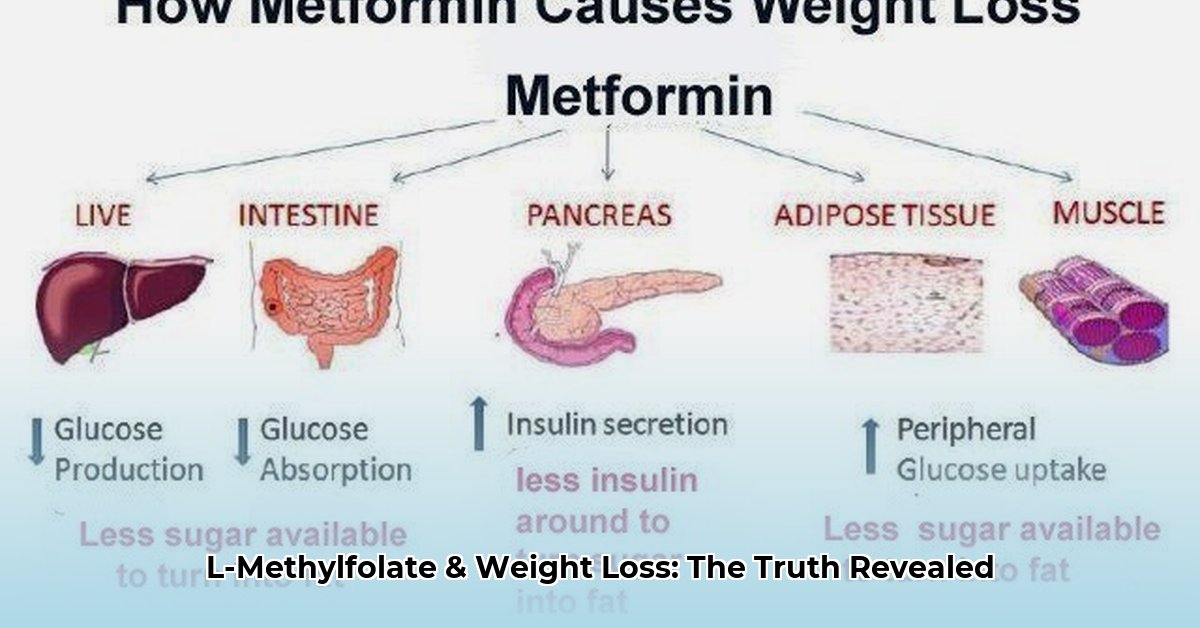
Understanding L-Methylfolate and its Role in the Body
L-methylfolate, the active form of vitamin B9 (folate), plays a crucial role in various bodily processes. It's essential for DNA synthesis, cell division, and the production of neurotransmitters like serotonin and dopamine. But does this translate to weight loss benefits? The current research presents a nuanced picture. Many individuals wonder if this vitamin can assist in their weight loss journey.
Methylfolate's Involvement in Metabolic Processes
A key function of methylfolate is its participation in methylation, a biochemical process influencing numerous metabolic pathways. One crucial pathway involves the conversion of homocysteine to methionine, a step vital for energy production and other metabolic functions. Some theorize that influencing these pathways could have indirect effects on weight management, but the evidence remains inconclusive. Is there a direct link between improved metabolic function and weight loss? The answer is currently: we don't know definitively.
The Current State of Research on Methylfolate and Weight Loss
While some smaller studies hint at a possible association between L-methylfolate supplementation and weight loss, particularly in overweight individuals, the evidence is far from conclusive. Larger, well-designed clinical trials are needed to confirm these preliminary findings. Currently, there's insufficient scientific evidence to support the use of L-methylfolate as a primary weight loss strategy. "The research supporting L-methylfolate for weight loss is currently limited," states Dr. Anya Sharma, MD, a leading researcher in nutritional biochemistry at the University of California, San Francisco. It's crucial to approach such claims with a healthy dose of skepticism until more robust data emerges.
Methylfolate and MTHFR Gene Mutations: A Clearer Benefit
The picture changes significantly for individuals with MTHFR gene mutations. These mutations impair the body's ability to efficiently convert folic acid (the synthetic form of folate) into its active form, L-methylfolate. For those with MTHFR, supplementing with L-methylfolate can be highly beneficial, improving folate metabolism and potentially alleviating associated symptoms like fatigue and mood disturbances. While this may indirectly impact weight by improving overall well-being, it shouldn't be considered a direct weight-loss mechanism. "While not directly impacting weight, L-methylfolate supplementation can markedly improve the well-being of individuals with MTHFR mutations," explains Dr. David Lee, PhD, a geneticist at Stanford University specializing in nutritional genomics.
The Importance of Consulting Healthcare Professionals
Before initiating any supplement regimen, including L-methylfolate, consultation with a healthcare professional is paramount. They can assess your individual needs, considering potential drug interactions and pre-existing health conditions. This is particularly important if you are taking blood thinners or other medications that might interact with folate. A doctor can aid in determining an appropriate dosage and monitor for any potential side effects. "Always prioritize a conversation with your healthcare provider before starting L-methylfolate, especially if you have any underlying health issues or take other medications," advises Dr. Sarah Miller, RD, a registered dietitian specializing in personalized nutrition.
Navigating Misinformation: Separating Fact from Hype
The internet is rife with anecdotal evidence and unsubstantiated claims surrounding L-methylfolate and weight loss. It's crucial to rely on credible sources and scientific research when evaluating such information. Many websites and social media posts often oversell the weight-loss potential of supplements. Remember that consistent effort towards a balanced diet and regular exercise remains the cornerstone of sustainable weight management. Supplements should be viewed as supplementary tools, not miracle cures. How can we best determine reliable health information online? By verifying information with reputable medical sources like the Mayo Clinic and the National Institutes of Health.
Key Takeaways:
- L-methylfolate's role in weight loss is currently unclear; more research is needed.
- Individuals with MTHFR gene mutations may benefit from supplementation, but not necessarily for weight loss.
- Always consult a healthcare professional before using L-methylfolate supplements.
- Sustainable weight management requires a holistic approach encompassing diet, exercise, and overall well-being.
- Don't rely on supplements as a primary weight-loss solution.